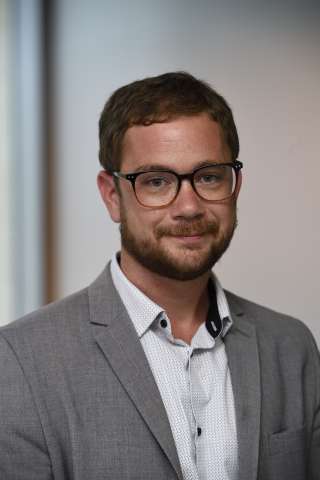
Improving Health for All in New Mexico: Q&A with Bloomberg Fellow Joseph Buffaloe
March 11, 2020
As a medical case manager and health insurance enrollment specialist for a hepatitis-C specialty clinic in New Mexico, Joseph Buffaloe can readily relate to his clients’ struggles within the healthcare system: He’s a Type-1 diabetic who’s had to ration insulin and has lived through his own mental health and substance abuse issues. From personal experience, Joseph knows that complicating socioeconomic factors, such as poverty, a shortage of affordable housing, addiction, and trauma, can limit a person’s ability to receive the best health care possible. As a Bloomberg Fellow, he is embarking on a multipronged course of study—covering data analysis, finance, and management, among other areas—to develop better ways to fight barriers to quality healthcare for his clients and other patients.
We spoke to Joseph about his work at Southwest CARE, an organization that aims to improve the health of culturally diverse communities throughout New Mexico, and his goal of helping all patients receive the care they deserve.
What drives you, and how did this bring you to your interest in public health?
Everyone deserves the best health care possible. But although we have the medical and scientific knowledge necessary to treat a variety of health issues, we don’t have systems in place to do this effectively. To solve this disparity, a lot of health challenges have shifted away from the clinical side toward policy-level issues. Working as a medical case manager and health insurance enrollment specialist the last few years, I’ve gotten frustrated helping people on an individual level when systemic problems could be fixed instead.
What public-health related work have you done that you’re most proud of?
The work I’m proudest of has been advocating for access to curative hepatitis C treatments in New Mexico. When all-oral direct-acting antiviral treatments first took off, the cost was prohibitive to a lot of insurers. When insurers were denying coverage to medications, it was my job to do everything possible to help my clients get them. We were lucky in New Mexico to have people at high levels who listened when health care providers complained and helped open up access to all of our Medicaid members.
What question or problem in your community keeps you up at night?
We can cure hepatitis C with a couple months of pills, but that’s not going to solve structural issues. So many people in New Mexico—and throughout the United States—are at a disadvantage due to intergenerational poverty, skyrocketing rent, under-resourced schools, historical trauma, or the criminalization of populations that use drugs, perform sex work, are precariously housed, or are sexual or racial minorities. Unless we as a society fight these deeper issues, there will continue to be disparities in health outcomes.
How is the Bloomberg Fellows Program helping you to tackle that problem? What impact do you hope you to make as a Bloomberg Fellow?
I love the focus at Johns Hopkins on collaboration. None of these problems are going to be solved by one field, much less one individual. The health care field has a lot of power, though, and has so much capacity to create change, especially when working hand-in-hand with government, law enforcement, education, and community organizations. In my studies, I’m focusing on understanding data, since that’s really the main tool of public health, but I’m also focusing on financing and management, so that I can help make innovative programs a reality.
Tell us something surprising or unexpected about yourself or your work.
I never planned on doing this work at all. I have a degree in creative writing! After a brief stint teaching high school, I stumbled into working with adults with intellectual disabilities. I really loved that work, and as the years went by I learned a lot of problem solving skills out of necessity, even while I was going through a very difficult time in my personal life. Eventually, my current job opened up, and I snuck into the medical field through the back door.
Connect With Us
Receive all the latest news from the Initiative by signing up for the American Health Dispatch newsletter, subscribing to the American Health Podcast, and subscribing to our YouTube channel.
Contact Us